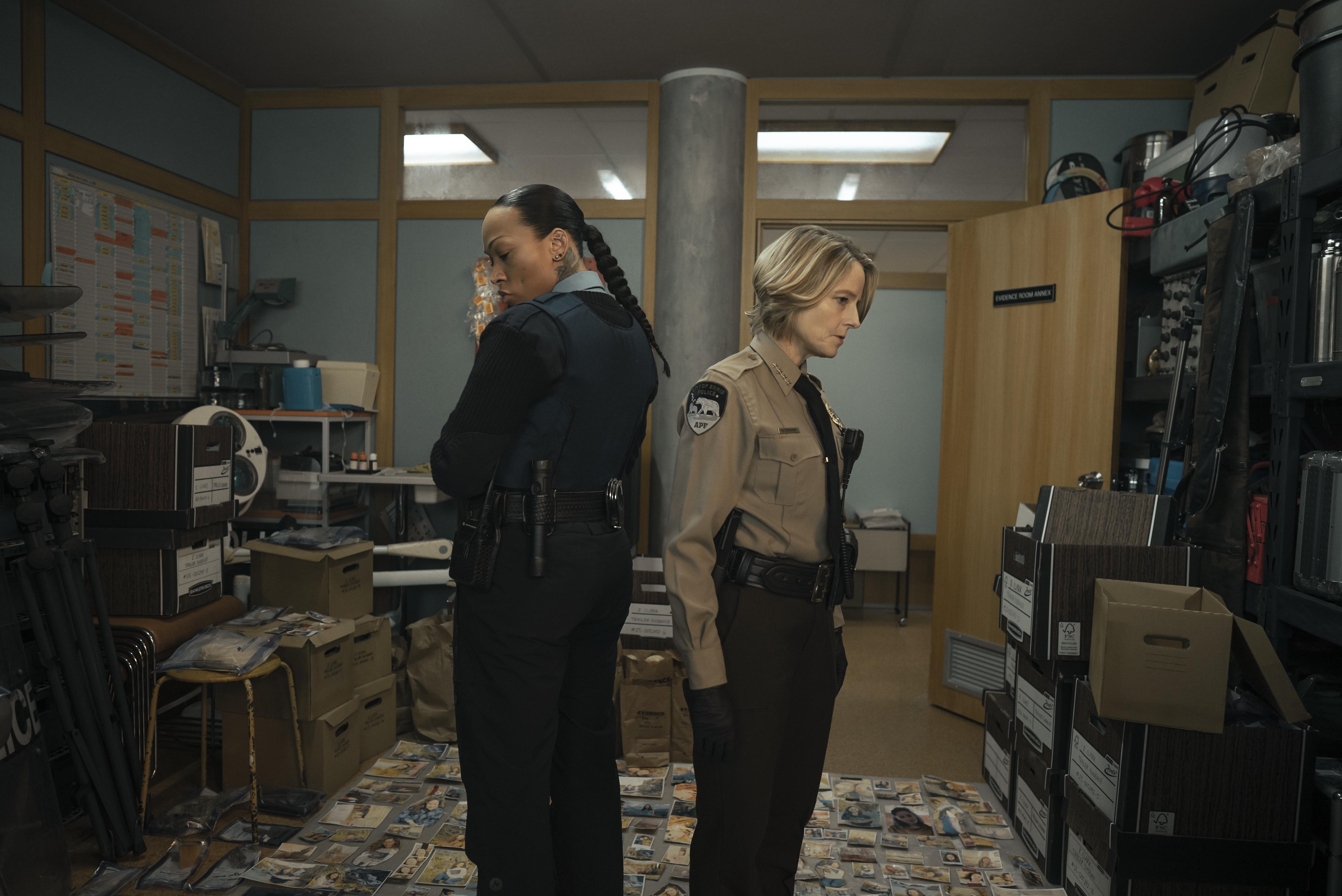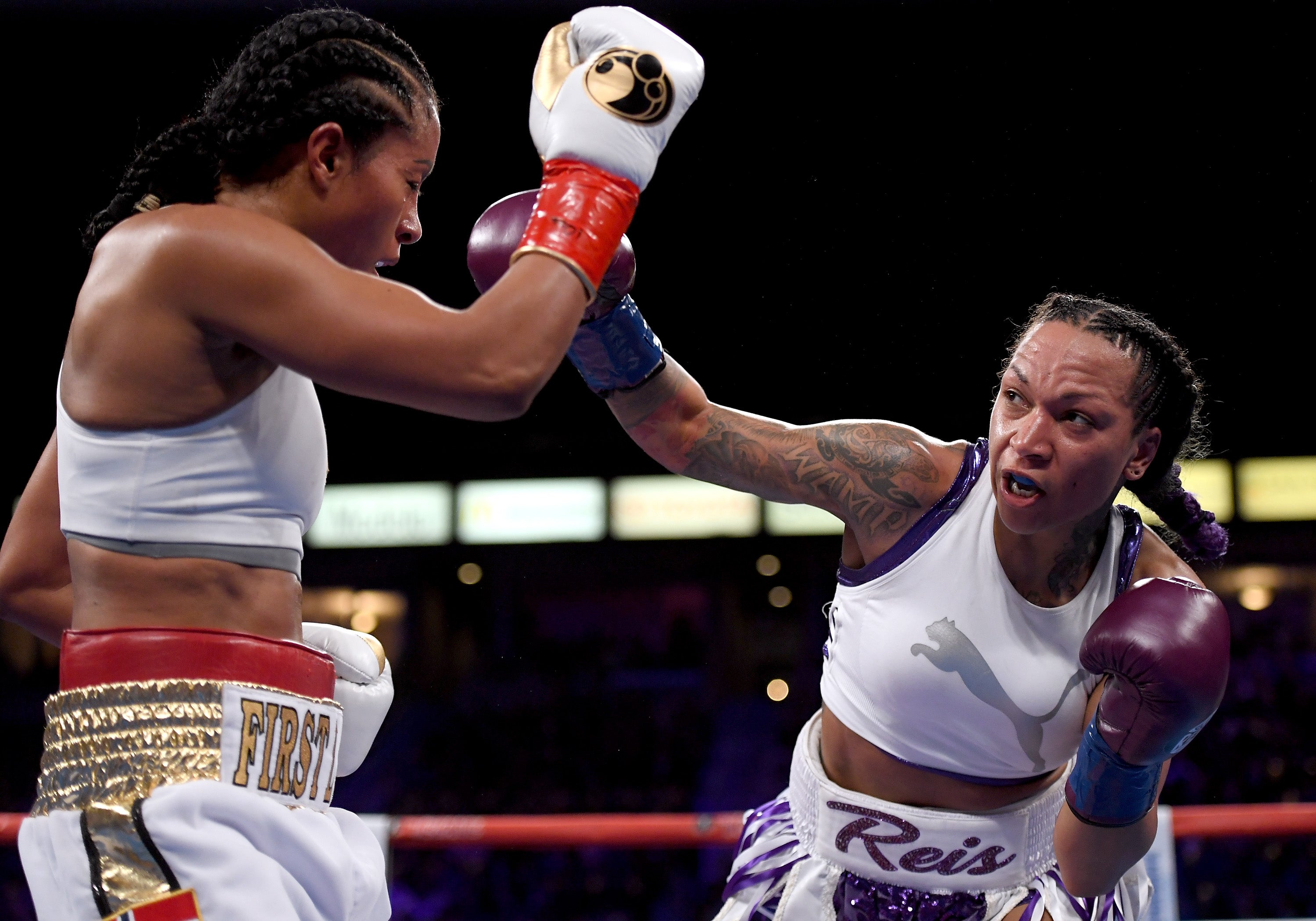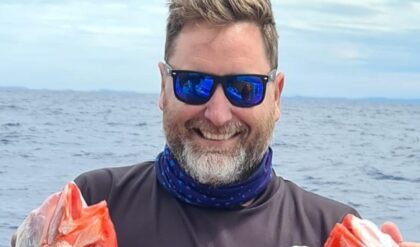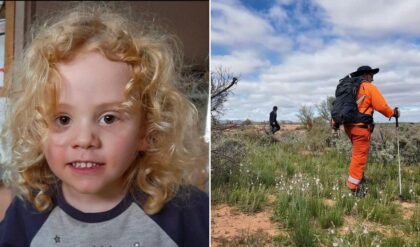Kali Reis is not where you’d expect her to be. The former world champion boxer who plays a hard-as-nails cop in True Detective is video calling in from her stepdaughter’s bedroom, a dazzling mélange of pink wallpaper, LED strip lighting and Care Bears posters.
The single bed behind her is full to bursting with giant plush toys. It looks like the personal hell of Alaska state trooper Evangeline Navarro, who Reis portrays in the HBO thriller. “This is where I have my personal raves,” she says, laughing.
The fourth chapter in the True Detective saga, subtitled Night Country, is good. Really good, in fact. As Navarro, Reis brings a bristling intensity, whether she’s pinning down a bad guy or reluctantly opening up about her mother’s unsolved murder. The 37-year-old more than holds her own among a heavyweight cast, led by Oscar winner Jodie Foster, after two forgettable seasons fronted by Colin Farrell and Mahershala Ali, respectively.
With Night Country, Reis and Foster have guided the show back to the brilliance of Matthew McConaughey and Woody Harrelson’s searing first series, but in a very different way. Foster plays Liz Danvers, the cantankerous police chief of a small town on the fringes of the Alaskan wilderness. She and Navarro must work out how and why a group of polar scientists left their station and ended up naked and frozen to death in a jumble of bodies out on the ice. In McConaughey and Harrelson’s Louisiana-set series, women fell into three categories: sex workers, “nagging wives” or dead. Night Country flips these tropes on their head. “This series wouldn’t work with two female nurses,” Reis says. “You have two detectives in a male-dominated world who have a gender fluidity that you can see throughout the series. They have this very masculine energy they both have to carry in this profession.”
It didn’t take long before this role reversal drew the ire of misogynistic “bros” – to use series director Issa Lopez’s term. The showrunner recently spoke out against “bros and hardcore fanboys” who review-bombed Night Country on Rotten Tomatoes, posting negative ratings to sabotage the show’s score. “If they could just get their heads out of season one’s ass, that’d be great,” Reis asks of the critics. “Issa did not attempt to rewrite the first season; there are connections to the first season, there’s an homage to the first season, but it is not trying to duplicate it.”
In a recent interview with The Independent, Christopher Eccleston (who plays Danvers’ married lover and boss) praised the series’ stereotype-defying sex scenes. “In the first episode you see both female detectives coming to men for sex and then leaving. Both men are shown trying not to come because they want to please the women, who are absolutely in charge,” he said. In the scene Ecclestone describes, Navarro flips local musher Eddie Qavvik (Joel D Montgrand) on his back and rides him while grabbing his throat. “I got accused of my character being a raper!” Reis says incredulously. “I’m like: what century do you live in?”
Sex scenes are new territory for Reis, who marks just her third-ever acting role in Night Country. The newcomer made her screen debut in Catch the Fair One, Josef Kubota Wladyka’s 2021 revenge thriller about a boxer who voluntarily joins a sex trafficking ring to find her missing sister. It was an obvious route into the acting world for Reis, who had built a name for herself as a professional boxer with a formidable record of 19 wins – five by knockout. Put her name into YouTube and you’re more likely to find clips of her bludgeoning opponents in the ring than a BuzzFeed puppy interview. “Everything was so new,” she says of filming the more intimate scenes in True Detective, “I was like, ‘OK, you guys gotta explain everything, is there tongue in there?’”
There were some more familiar fight scenes, too, of course. In one, Navarro goes on a self-destructive rampage, picking a scrap with three barflies who give her a beatdown (after taking a few thumps themselves). Was it hard for Reis’s boxer ego to get handed her first knockout defeat? “Navarro wasn’t knocked out, she was just knocked down,” Reis is hasty to point out. “That was a little tough, though, but I took notes from the people I’ve knocked down in the ring.”

Reis and Foster as dream detective duo in ‘True Detective’ (HBO)
Today, appearing from her home in Philadelphia, the former world champ looks comfortable. Her hair is tied up in a ponytail and she’s wearing a baggy T-shirt with the slogan “Stay Trippy” on it. Her face is punctuated by silver jewellery in her ears, cheeks and septum, and her nails are pointed black claws. She’s conscious that, from the outside, both she and Navarro might appear intimidating. “Being a professional boxer, you can hand me a gun and I can stand there and look mean,” she says. “The hard part is being able to bring the audience in without saying a word.” Throughout the series, the detective’s icy exterior melts into moments of fragility. “There are a lot of ways I’m like Navarro and there are a lot of ways I’m not,” Reis says. “I believe for me, personally, that my strength has come from my vulnerability. As soon as Navarro allows herself to become vulnerable, that’s when she finds her true strength.”
In 2017, a year after Reis won the WBC female middleweight title, her brother died from brain cancer. “Boxing was our thing,” she explains. “After he passed away, I didn’t want nothing to do with it.” As a result, Reis started exploring other options. She’d always been creative, or as she puts it, “a little Virgo” – “I asked for a violin aged nine for Christmas.” She laughs. Her mum, who raised Reis and all five of her siblings by herself, was always “throwing” her into plays as a child, whether she liked it or not. Besides that, though, there really wasn’t much thought behind her new career choice. “I was like, ‘You know what? Acting seems kind of cool.’ I don’t know, it was on my radar. I was thinking I could land like a cameo in a commercial, be an extra? I just wanted to try it.” Just one week after Reis put out some feelers, Wladyka reached out to her on Instagram about Catch the Fair One. “And here we are,” she says.
Both that film and Night Country deal with the murders and disappearances of indigenous women, a cause that Reis is extremely passionate about. The actor is of mixed Cape Verdean and Wampanoag Native American ancestry, while Navarro is Iñupiat and Dominican. “I am not Native Alaskan, Iñupiat or Inuit, but there’s a collective group of morals that indigenous people share,” she says. “So it’s very important for me to be able to have this type of project done the right way. We had Alaskan native producers going through the script with a fine-tooth comb. I don’t want to make the age-old mistake of assuming I know about a culture.”
We’re speaking the day after Lily Gladstone made history by becoming the first Indigenous American woman to be nominated for an Oscar for Best Actress, thanks to her role in Martin Scorsese’s Killers of the Flower Moon. “When she won the Golden Globe [another historic first], I was sitting folding laundry,” Reis remembers. “I literally burst out screaming and crying. This is an amazing time for Native American Indigenous talent.”

Kali Reis punches Cecilia Braekhus of Norway in the World Welterweight Championship in 2018 (Getty)
It might only be her third-ever acting gig– she also had a small part in Jean-Stéphane Sauvaire’s yet-to-be-released paramedic thriller, Asphalt City – but Reis carries Navarro with the assuredness of someone who knows they’re in a role they were born to play. “It’s funny, looking back at it now: I’ve been training to be an actor my entire boxing career,” she muses. “The constant ups and downs; repetition, repetition, repetition; being able to take criticism; thinking on your feet.” She compares directors to coaches, and likens working with two-time Academy Award winner Foster to training in a “gym full of champs”. “I’m not walking into a gym to be the big dog; I want to be the worst one in the room so I can get better,” she says.
The Silence of the Lambs star sounds like the perfect sparring partner for an up-and-coming talent. “She doesn’t take anything too seriously – if she screws up, she screws up,” Reis says. “And she’s so generous with her knowledge, her time, her ideas. She’s an amazing person.”
The cast also had an incredible set to work with, I tell her, addressing the elephant in the room, or rather: the “corpsicle” in the ice rink. In episode two, the frozen bodies of the scientists are transported to the local hockey rink to thaw in a mangled mess of limbs and frostbitten private parts. It performs a surprisingly central role in the series, with characters returning to it again and again like a demented version of the Central Perk café in Friends. “It was so amazingly made,” Reis says; “everything was so detailed, every hair, every testicle – the frostbite on the feet.” It didn’t take long to become desensitised. “By day two I was drinking coffee next to it, giving the dead dudes a fist bump.”
Without giving too much away, thawing the corpsicle promises to unlock the key to cracking the case. “It’s gonna shock everyone,” Reis teases of the forthcoming series finale, and the big reveal of who has been behind the murders. “I really think it’s gonna throw people off – in a good way.”
Reis now has “Prestige HBO Drama Star” to add to her list of titles. Will it be enough to tempt her out of the ring for good? “My career and women’s boxing as a whole has been on a really great trajectory,” she says with a smile. “I haven’t hung up the gloves just yet.”



